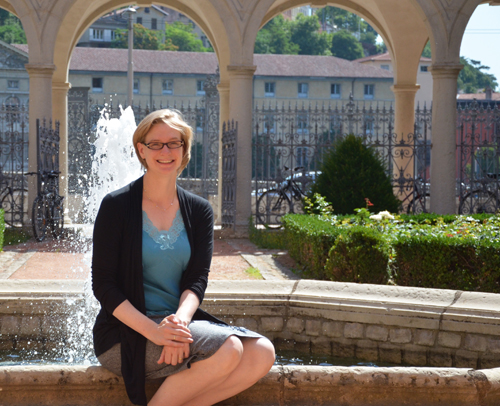
Car engines, honking horns and airplanes have bombarded our ears for decades, but U of G music professor Kimberly Francis points out that we are increasingly surrounded by music, thanks to broadcast systems in stores and public buildings, iPods and mobile phones. Sounds like a good thing, but Francis says: “We are steeped in this noise, with the messages being passed along in the lyrics and music, but we are not always aware or thinking critically about it.”
Francis, who describes herself as a feminist musicologist, is especially interested in the links between music and gender. “How do we use music as a means of projecting our sense of self, especially as that relates to gender?”” she asks. “What do the lyrics in popular music have to say about gender? What can we learn about gender from watching Glee?” Francis, who came to U of G in September 2010, will be teaching a course in music and gender starting in the winter semester.
Her interest in seeing music through a feminist perspective colours all the research she does, from an examination of current pop songs by Canadian women to an exploration of the life of Nadia Boulanger, a French composer, conductor and teacher who was based in Paris during the 20th century. Francis travelled to Lyon and Paris, France and London, England this summer to conduct more research about Boulanger and her impressive contributions to the world of music.
“The trouble with Boulanger is that every time you turn around, there is another packet of letters or other documents turning up,” Francis says.
Francis dreamed of becoming a conductor when she was a teenager, and first heard of Boulanger as the first woman to have conducted some of the world’s great orchestras. As a university student, Francis became interested in learning more about this accomplished woman, but found “only four or five books about her, all very superficial and mostly written by her former students.” Francis wanted something more, and began researching letters and other documents to and from Boulanger. “I went looking for her voice. What I found was a very passionate, complex and compelling individual.”
Francis, who grew up in Burlington, Ont., did her undergraduate work at the University of Western Ontario and her master’s at the University of Ottawa. For her PhD, she moved to Chapel Hill to work with a professor who researched Nadia Boulanger and her sister, Lili. “I wanted to write about Boulanger and her influence on Igor Stravinsky,” explains Francis. “Stravinsky’s archives are in Switzerland, so I travelled between there and Paris to do my research. And in those letters to Stravinsky, I found Boulanger’s voice.”
Boulanger began as a composer, but achieved her fame as a teacher who worked with many of the biggest names in the field of music, including Aaron Copland. She was friends with Stravinsky for more than 40 years. Francis says that as a Frenchwoman teaching music in France, Boulanger fought for recognition in a male-dominated field, but she was able to attract attention and students from around the world, especially the United States.
“She was contradictory in many ways,” says Francis. “She would tell her female students that their primary role was to be a wife and mother, yet she herself never married. I’m interested in seeing how the changing perceptions of women during the years she lived affected her.” Boulanger, born in 1887, was 92 when she died in 1979, having lived through two World Wars, the Great Depression and the women’s liberation movement.
Francis is also interested in how our society views music teachers. “Do we undercut the value of the music teacher?” she asks. “How important was Boulanger to the later accomplishments of her students?”
Certainly it’s clear from her research that Boulanger contributed significantly to Stravinsky’s work, Francis says, by copyediting his scores and promoting his music even before it was published. “He depended on her and she on him for a long time,” she adds.
This summer’s research, Francis says, should help “put all the puzzle pieces together” and give her a fuller picture of Boulanger’s life and contributions to the world of music. The material she gathers will provide the basis for several books, she expects, and she is already working with a publisher.